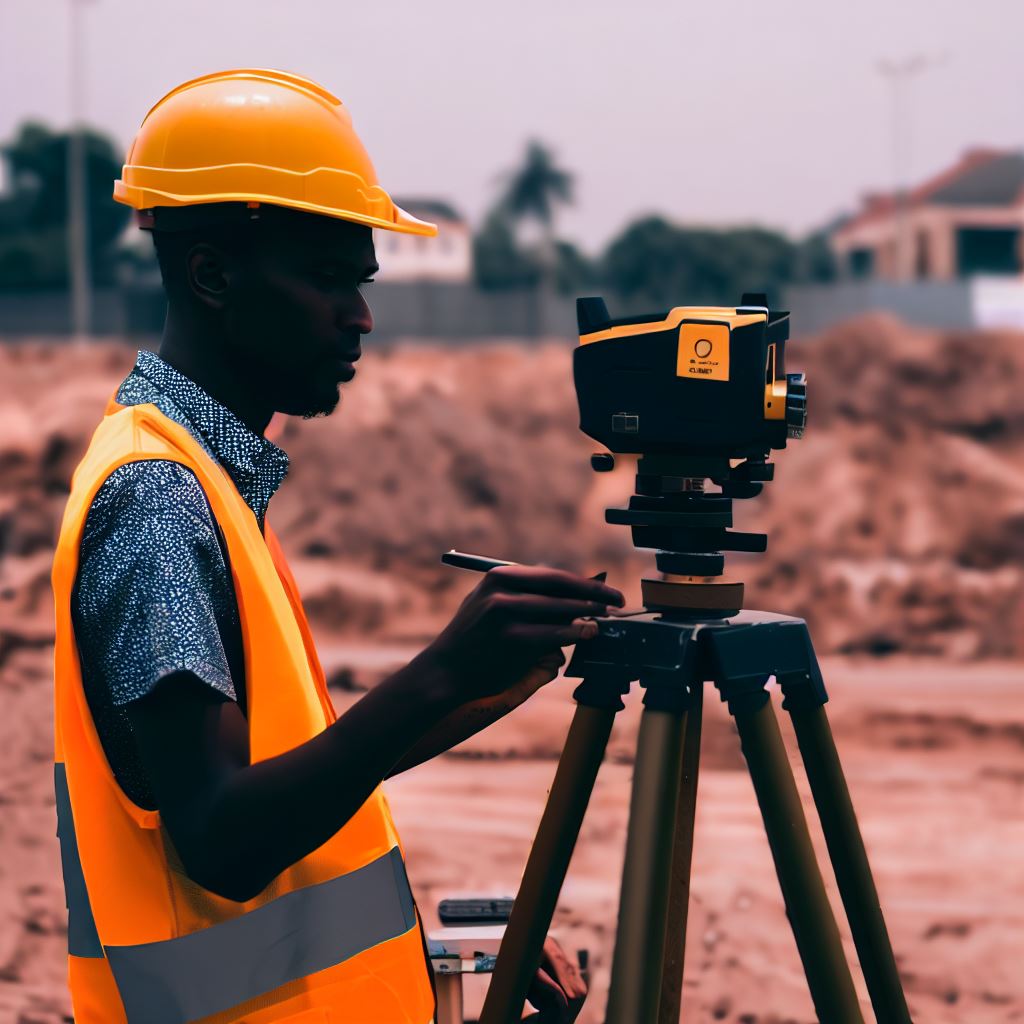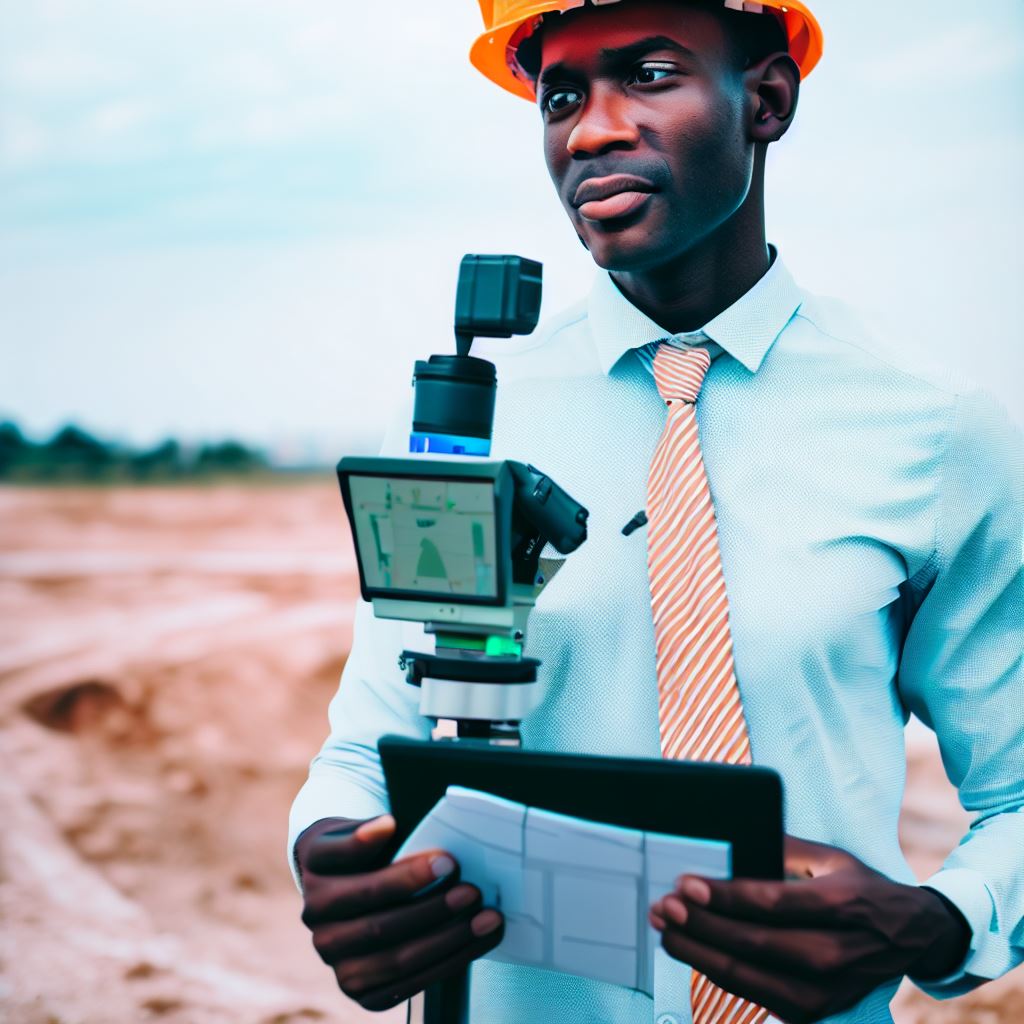Introduction
In this blog post , we will dive into how COVID-19 Has Impacted Surveying in Nigeria. The COVID-19 pandemic has brought about unprecedented changes in various industries globally, including surveying.
In Nigeria, surveying plays a significant role in land acquisition, property development, and infrastructure planning.
Understanding how COVID-19 has influenced surveying practices in Nigeria is essential for adapting to the new normal.
The study aims to investigate the challenges faced by surveyors in Nigeria during the pandemic, such as travel restrictions, limited fieldwork, and reduced access to resources.
By examining these impacts, we can identify potential solutions and strategies to overcome the obstacles posed by COVID-19.
Furthermore, the study seeks to understand how the adoption of digital technologies in surveying has helped mitigate the effects of the pandemic.
Remote sensing techniques, virtual meetings, and online data collection methods have become increasingly prevalent during this time.
Examining the effectiveness and adoption of these technologies will guide future practices in the field.
Overall, this study will provide valuable insights into the changes experienced by surveying professionals in Nigeria due to COVID-19.
By understanding the challenges and opportunities brought about by the pandemic, we can develop effective strategies for the future of surveying in Nigeria.
Background on Surveying in Nigeria
Definition and Importance of Surveying in Various Industries
- Surveying is the measurement and mapping of the earth’s surface to gather data.
- It plays a vital role in industries such as construction, real estate, mining, and urban planning.
- Surveyors use advanced equipment to determine accurate positions, distances, and elevations.
- The data collected by surveyors is essential for making informed decisions in various projects.
- It helps in site selection, designing infrastructure, analyzing environmental impact, and ensuring safety.
- Surveying provides valuable information for land development, property ownership, and boundary disputes.
- It is instrumental in creating accurate maps, charts, and geographical information systems (GIS).
- Surveying also aids in disaster management, navigation, and monitoring infrastructure maintenance.
Current State of Surveying in Nigeria
- Nigeria has a growing surveying sector due to rapid urbanization and infrastructure development.
- Surveying in Nigeria is regulated by professional bodies such as the Nigerian Institution of Surveyors.
- The profession has seen advancements with the use of modern technologies like GPS and laser scanners
- However, the lack of adequate funding, outdated equipment, and poor infrastructure pose challenges.
- Surveyors in Nigeria face difficulties in accessing remote areas and obtaining accurate data.
- There is a shortage of skilled surveyors, leading to delayed projects and compromised quality.
- The profession also faces issues of corruption and unethical practices in the industry.
- Efforts are being made to improve the state of surveying in Nigeria through education and training.
Role of Surveyors in Infrastructure Development and Land Management
- Surveyors play a crucial role in the development of infrastructure projects in Nigeria.
- They provide accurate measurements and topographic data for construction planning.
- Surveyors help in site selection, land acquisition, and determining property boundaries.
- They collaborate with engineers, architects, and urban planners to ensure effective project implementation.
- Surveyors contribute to land management by conducting cadastral surveys and creating land records.
- They help in resolving land disputes and ensuring fair distribution of resources.
- Surveyors also play a key role in maintaining and updating the national geodetic datum.
- Their expertise is essential in creating accurate maps and spatial data infrastructure.
- Through their work, surveyors support sustainable land use, resource management, and urban development.
- Despite the challenges faced, surveyors continue to be instrumental in Nigeria’s progress and growth.
Surveying is a critical profession that contributes to various industries and infrastructure development in Nigeria.
It provides essential data for decision-making and plays a significant role in land management.
Despite the current challenges, surveyors are striving to improve the state of surveying in the country and ensure accurate and reliable measurements for future projects.
Read: Sustainable Development and Surveyors’ Role in Nigeria
Impact of COVID-19 on Surveying in Nigeria
The outbreak of the COVID-19 pandemic has had a profound impact on surveying activities in Nigeria. This chapter explores the various ways in which the virus has disrupted the surveying sector in the country.
Disruption of fieldwork activities
One of the major challenges faced by surveyors in Nigeria during the pandemic has been the disruption of fieldwork activities.
The imposition of movement restrictions and lockdown measures by the government severely limited surveyors’ ability to conduct fieldwork.
With restricted movement, surveyors faced significant obstacles in accessing various locations, especially remote areas. This hindered their ability to collect accurate data and carry out essential surveys.
Delay in project timelines
The pandemic has also resulted in significant delays in project timelines within the surveying sector. Construction projects were suspended as a precautionary measure to prevent the spread of the virus.
As a consequence, surveying work linked to these projects was halted, leading to delays in their completion.
Additionally, surveyors faced challenges in completing their tasks as planned due to the restrictions imposed by COVID-19, such as limited working hours and reduced workforce availability.
Economic implications for surveyors
The economic impact of the pandemic on surveyors in Nigeria cannot be overlooked. With many construction projects suspended or delayed, surveyors experienced reduced job opportunities.
This resulted in a decline in income and employment instability for professionals in the field.
Moreover, surveying businesses and professionals faced severe financial strain due to the overall economic downturn caused by the pandemic.
The lack of project contracts and delayed payments have significantly affected their financial stability and ability to sustain their operations.
The COVID-19 pandemic has had a disruptive and detrimental effect on the surveying industry in Nigeria.
The imposition of movement restrictions and lockdown measures hindered fieldwork activities, leading to data collection challenges.
The delay in project timelines caused by construction suspensions has resulted in setbacks for surveying work.
Furthermore, surveyors have faced economic hardships due to reduced job opportunities and financial strain on their businesses.
It is crucial for the government and relevant stakeholders to address these issues and provide support to mitigate the impact of the pandemic on the surveying sector.
Read: The Historical Evolution of Surveying Profession in Nigeria
Study Methodology
Research approach and design
The research approach for this study was quantitative, and the design used was descriptive.
Data collection methods
- Surveys and questionnaires were used to gather data from surveyors and professionals in the industry.
- Interviews were conducted with surveyors and industry experts to gain deeper insights into the impact of COVID-19.
Sample size and demographics
The study targeted a sample size of 200 surveyors and professionals in the surveying industry in Nigeria.
To ensure diversity, the sample included individuals from different regions, years of experience, and organizations.
The respondents were selected through a combination of convenience sampling and snowball sampling techniques.
Data Collection Instruments
1. Surveys and Questionnaires
The survey was designed to capture information about the effects of COVID-19 on surveying activities in Nigeria.
The questionnaire consisted of both closed-ended and open-ended questions.
The closed-ended questions allowed respondents to select options from a predefined list, while the open-ended questions encouraged extensive responses.
The survey was distributed using online platforms, such as email, social media, and professional networking sites, for wider reach and convenience.
2. Interviews with Surveyors and Industry Experts
In-depth interviews were conducted with selected surveyors and industry experts to gather qualitative data.
The interviews were semi-structured, allowing for flexibility while covering key themes related to the impact of COVID-19 on surveying in Nigeria.
The interviews were conducted either face-to-face or through video conferencing platforms, based on the participants’ preference and availability.
Data Analysis
1. Quantitative Analysis
The quantitative data obtained from surveys and questionnaires were analyzed using statistical software.
Descriptive statistics, such as frequencies, percentages, and cross-tabulations, were calculated to summarize and present the data.
The analysis provided insights into the prevalence and magnitude of the impact of COVID-19 on surveying activities in Nigeria.
2. Qualitative Analysis
The qualitative data obtained from interviews were transcribed and analyzed thematically.
Themes and patterns related to the effects of COVID-19 on surveying practices in Nigeria were identified and examined.
The analysis helped in gaining a deeper understanding of the challenges faced by surveyors and the strategies adopted to mitigate the impact of COVID-19.
Validity and Reliability
To ensure the validity of the study, a pilot test was conducted with a small group of surveyors to refine the survey questionnaire and interview questions.
Their feedback helped in enhancing the clarity and relevance of the data collection instruments.
To enhance reliability, steps such as data triangulation, member checking, and expert review were undertaken.
Data triangulation involved comparing findings from different data sources and methods, ensuring consistency and credibility.
Member checking involved verifying key findings with selected participants to ensure accuracy.
Expert review involved seeking input and feedback from experienced researchers in the field to validate the study findings.
Overall, the chosen methodology ensured comprehensive data collection and analysis, providing valuable insights into the impact of COVID-19 on surveying in Nigeria.
Read: Real Estate Surveying in Nigeria: An Industry Overview

Findings and Analysis
Overview of collected data
The study collected data from various surveyors in Nigeria to assess the impact of COVID-19 on surveying activities.
Impact of COVID-19 on fieldwork activities
1. Reduction in the number of field surveys
Due to travel restrictions and social distancing measures, many field surveys were canceled or postponed.
2. Challenges faced during fieldwork
Surveyors faced difficulties in accessing certain areas, obtaining permissions, and maintaining safety protocols during fieldwork.
Effect on project timelines
1. Delay in project completion
The disruptions caused by the pandemic resulted in project delays, affecting completion timelines.
2. Increased project costs
Extended project timelines led to additional expenses, such as equipment maintenance and extended workforce availability.
Economic consequences for surveyors
1. Job losses and reduced income
The pandemic negatively impacted the surveying industry, leading to job losses and reduced income for surveyors.
2. Adaptation strategies implemented by surveyors
Surveyors adopted alternative strategies, such as remote surveying and digital data collection, to mitigate the economic impact.
The findings of this study highlight the significant impact COVID-19 has had on surveying activities in Nigeria.
The reduction in field surveys, challenges faced during fieldwork, delays in project completion, increased project costs, job losses, and reduced income for surveyors all demonstrate the adverse effects of the pandemic.
However, surveyors have also shown resilience by implementing adaptation strategies to navigate through the crisis.
Moving forward, it is crucial for the surveying industry to continue embracing new technologies and innovative approaches to mitigate the impact of future disruptions.
Read: Land Disputes in Nigeria: How Surveyors Play a Key Role
Discussion and Interpretation of Results
Findings with pre-COVID surveying practices
The survey results were compared with the practices that were in place before the COVID-19 pandemic.
It was found that there have been significant changes in the way surveying is conducted in Nigeria.
The traditional methods of on-site surveying have been replaced with innovative remote approaches.
The use of technology, such as drones and satellite imagery, has become more prevalent in surveying activities.
This shift has allowed surveyors to continue their work while adhering to social distancing guidelines.
Overall, the findings indicate that COVID-19 has accelerated the adoption of modern surveying techniques in Nigeria.
Key challenges faced by surveyors
During the study, several challenges faced by surveyors in Nigeria due to COVID-19 were identified.
The most significant challenge is the limited access to survey sites, especially in restricted areas.
Many surveyors faced difficulties in obtaining necessary permissions and permits to conduct their work.
Additionally, supply chain disruptions have affected the availability of surveying equipment and materials.
Some surveyors also reported a decrease in demand for their services, leading to financial hardships.
These challenges highlight the need for increased collaboration among surveyors and relevant authorities.
The resilience and adaptability of the surveying industry in Nigeria
Despite the challenges posed by COVID-19, the surveying industry in Nigeria has demonstrated resilience and adaptability.
Surveyors have quickly embraced new technologies and remote surveying methods to overcome the limitations imposed by the pandemic.
The industry has shown a remarkable ability to adapt to the changing circumstances and continue providing essential services.
The use of digital tools and virtual platforms for data collection, analysis, and communication has become the new norm.
Moreover, surveyors have collaborated with other professionals and organizations to find innovative solutions.
This adaptability has not only ensured the continuity of surveying activities but has also positioned the industry for future growth.
The findings of this study highlight the impact of COVID-19 on surveying practices in Nigeria.
The comparison of findings with pre-COVID practices reveals a significant shift towards remote surveying methods and the use of technology.
Publish Your Professional Profile, Business or Brand
Showcase your expertise, gain trust, and boost visibility instantly on Professions.ng.
Publish NowSurveyors have faced numerous challenges, including limited site access, supply chain disruptions, and decreased demand.
However, the industry has shown resilience and adaptability by embracing innovative approaches and collaborating with stakeholders.
Moving forward, it is essential for surveyors to continue leveraging technology and exploring opportunities for collaboration to ensure the growth and sustainability of the surveying industry in Nigeria.
Read: How to Become a Licensed Real Estate Agent in Nigeria
Recommendations and Solutions Implementing safety protocols for fieldwork activities
In order to minimize the risks associated with COVID-19, it is crucial to implement strict safety protocols for fieldwork activities.
This includes providing personal protective equipment (PPE) such as face masks, gloves, and hand sanitizers to all surveyors.
Additionally, regular disinfection of surveying equipment and vehicles should be conducted to ensure a safe working environment.
Surveying teams should also practice social distancing and avoid crowded places during their fieldwork activities.
Investing in technology for remote surveying
In light of the limitations posed by the pandemic, it is important for surveying bodies to invest in technology that allows for remote surveying.
This includes the use of drones or aerial imagery to gather data without the need for physical presence on the field.
Software solutions and applications that enable remote data collection and analysis should also be adopted to enhance efficiency and reduce the need for in-person interactions.
Collaboration between government and surveying bodies for support measures
To mitigate the impact of COVID-19 on surveying activities in Nigeria, there should be collaboration between the government and surveying bodies.
This collaboration should involve the development of support measures such as financial assistance programs and regulatory flexibility for surveyors.
The government can also facilitate the creation of a centralized platform or database to connect surveying professionals with potential clients or projects.
Providing financial assistance and training programs for surveyors
The government and surveying bodies should provide financial assistance and training programs to support surveyors during these challenging times.
This can include grants, loans, or subsidies to cover operational costs or investments in technology.
Training programs should also be organized to enhance the skills and knowledge of surveyors, particularly in the areas of remote surveying and data analysis.
By implementing these recommendations and solutions, the impacts of COVID-19 on surveying in Nigeria can be minimized.
It is crucial for both the government and surveying bodies to take proactive measures to ensure the continuity of surveying activities and support the professionals in the industry.
Only through collaborative efforts and adaptation to new technologies can the surveying sector overcome the challenges presented by the pandemic.
Conclusion
Summary of key points discussed
This study explored the impact of COVID-19 on surveying practices in Nigeria. It discussed the challenges faced by surveyors during the pandemic, such as travel restrictions and limited access to sites.
We also highlighted the role of technology in mitigating these challenges, with remote surveying tools becoming increasingly important in ensuring business continuity.
Furthermore, the study emphasized the significance of collaboration and knowledge sharing among surveyors to adapt and innovate in response to the pandemic.
Reflection on the long-term impact of COVID-19 on surveying in Nigeria
The long-term impact of COVID-19 on surveying in Nigeria cannot be ignored. The pandemic has accelerated the adoption of digital tools and remote working practices in the industry.
This shift in surveying practices is likely to continue even after the pandemic subsides, as it offers advantages such as improved efficiency, reduced costs, and increased safety for surveyors.
However, it also poses challenges, such as the need for upskilling and addressing potential job displacement.
Importance of adapting to the new normal in surveying practices
The importance of adapting to the new normal in surveying practices cannot be overstated. Surveyors need to embrace technology and acquire the necessary skills to thrive in a post-pandemic world.
Additionally, collaboration and knowledge sharing will be crucial in navigating the evolving landscape of surveying industry.
By embracing change and staying informed, surveyors can position themselves for success in the face of future challenges.
COVID-19 has significantly impacted surveying practices in Nigeria. However, it has also presented opportunities for innovation and transformation in the industry.
By adapting to the new normal, surveyors can overcome challenges and position themselves for long-term success.




